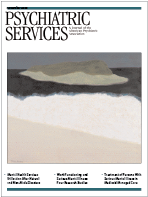Many studies have found a high prevalence of mental illness and mental health issues among various classes of immigrants. One study found that of 3,035 Cuban entrants to the United States who were evaluated for mental health after their entry in 1980, a total of 1,307 presented symptoms of personality disorders, schizophrenic disorders, adjustment disorders, mental retardation, chronic alcohol abuse, or major depression. Of these individuals, 459 needed more extensive psychiatric care. Other research indicates that an increased risk of mental illness among immigrants is associated with lower educational levels, fewer years of residence in the United States, occupational anxiety, home country anxieties, lower levels of acculturation, physical ill health, and previous traumatic experiences.
A representative of the U.S. Public Health Service for the southern California region has estimated that at least 10 percent of the detainees of the Immigration and Naturalization Service (INS) suffer from severe mental illness that requires attention. (The INS is now known as the Bureau of Immigration and Customs Enforcement [BICE] of the Department of Homeland Security [DHS].) As of October 5, 1999, the INS had a total of 984 detainees in the San Diego and Imperial County detention facilities. It was estimated that 10 percent were suffering from some form of mental disorder; a portion required immediate hospital care.
At that time, the INS screened long-term detainees for severe mental disorders but did not screen either short-term detainees or detainees housed in a contract facility rather than an INS-operated facility. Officers could be ill prepared to address situations involving mentally ill detainees because of a lack of screening procedures and gaps in officer training. This situation mirrors one that is not uncommon among law enforcement personnel. To address these gaps in training, we worked with the INS to develop a training program that would better prepare officers to deal with situations involving mentally ill detainees.
We conducted four focus groups with INS and INS-contracted personnel at detention sites in San Diego and Imperial Counties in California. Each multiethnic focus group of six to 12 men and women included officers with direct contact with the detainees, health care personnel, ancillary personnel, and supervisors. These focus groups explored officers' experiences dealing with detainees and their perceptions of mental illness. We also conducted similarly focused individual interviews with five key informants, including an officer in charge of a detention facility, an officer responsible for the development of training programs, a representative of the then Border Patrol, and two representatives of the Department of Public Health.
Four themes emerged from the focus groups and interviews: difficulty distinguishing between behavior that was symptomatic of mental illness and behavior that resulted from substance use; a belief that mental illness is synonymous with mental retardation; concern that mental illness could be transmissible to persons who have close contact with a person with mental illness; and a belief that people with mental illness are more violent than most individuals.
Together with volunteer officers and detainees, we developed a training manual and video based on our findings from the focus groups, interviews, a literature review, and consultations with mental health professionals. The initial versions of the training video and manual were previewed with a small group of INS volunteers in San Diego and Imperial Counties for review and comment. Appropriate revisions were made based on this feedback.
We held six training sessions with INS personnel during a two-year grant period. Each training session covered definitions and diagnostic categories of mental illness, signs and symptoms of mental illness, "culture-bound" syndromes, issues related to mental status that may arise in the context of detention, alternatives for resolving such issues, and relevant INS procedures and available resources. Although such training programs are not unique among law enforcement agencies, this program may be one of the few to emphasize cultural differences in the expression of mental illness.
Participant evaluations of the program have been overwhelmingly positive. Officers report that they are better able to distinguish between substance use and other forms of mental illness and that they are better prepared to address individuals who may be suffering from major depression. The INS now makes this training available to officers on a nationwide basis.

